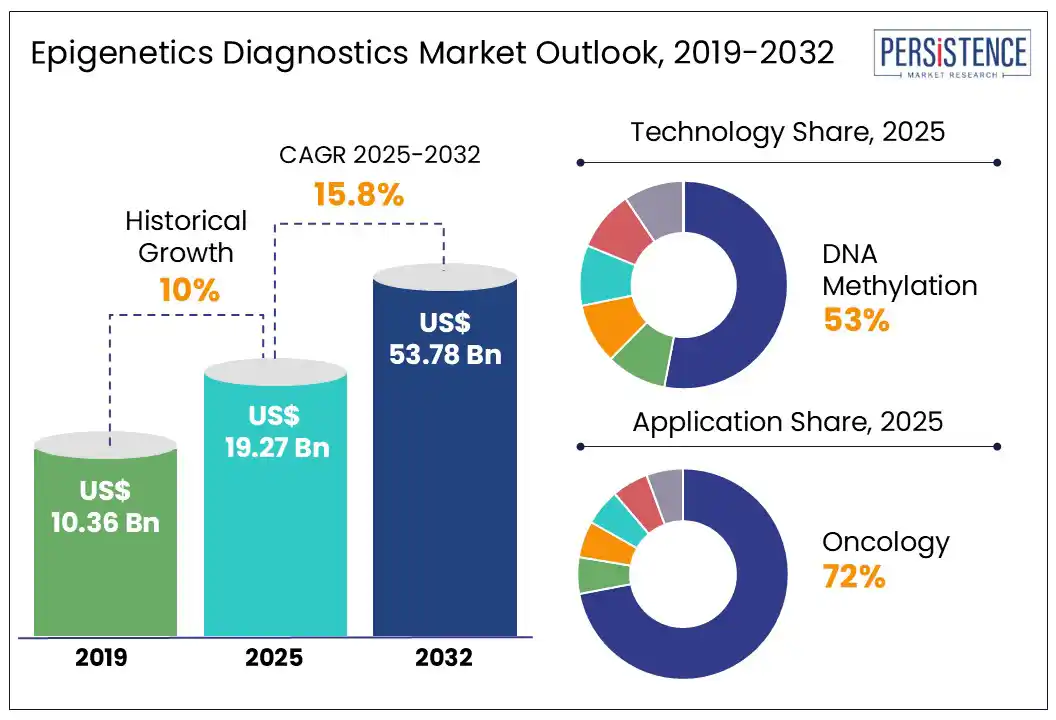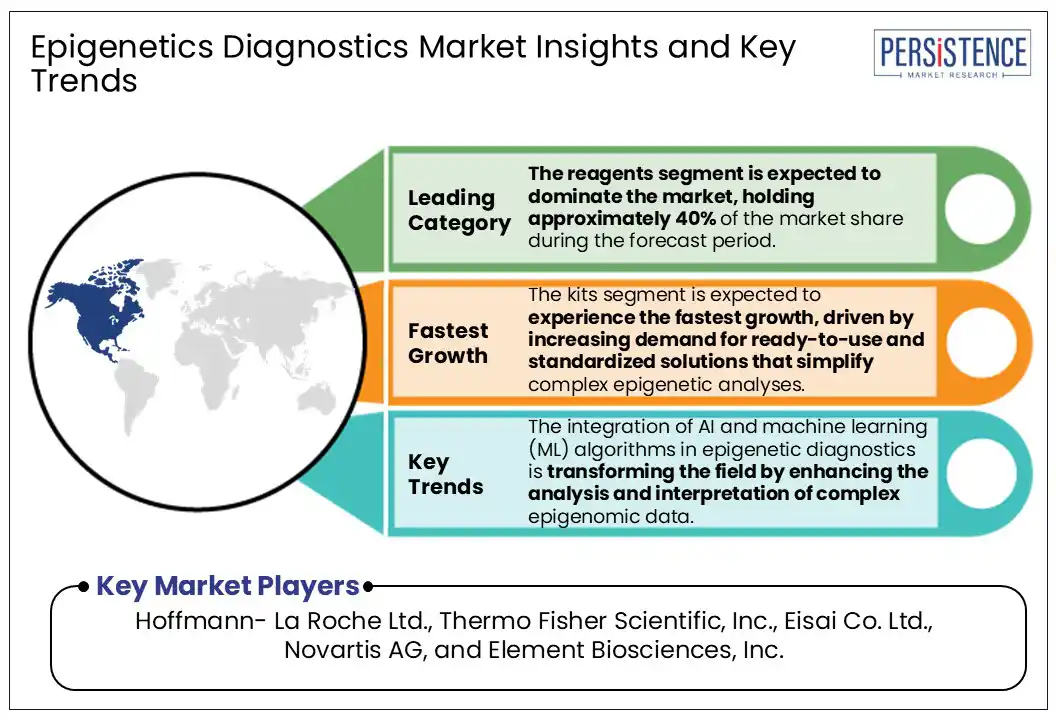ID: PMRREP35501| 195 Pages | 21 Jul 2025 | Format: PDF, Excel, PPT* | Healthcare

The global epigenetics diagnostics market size is likely to be valued at US$ 19.27 Bn in 2025 and is estimated to reach US$ 53.78 Bn in 2032, growing at a CAGR of 15.8% during the forecast period 2025 - 2032. The epigenetics diagnostics market is experiencing growth driven by the rising prevalence of cancers and chronic diseases, advancements in epigenomic technologies, increased awareness of early disease detection through epigenetic testing, and a growing demand for precision medicine.
Epigenetic diagnostics refers to the use of epigenetic changes, such as DNA methylation, histone modifications, and non-coding RNAs, as biomarkers to detect, diagnose, classify, and monitor various diseases. These changes influence gene expression without altering the underlying DNA sequence and are often reversible, making them particularly valuable for both diagnostic and therapeutic applications. Epigenetics diagnostics integrates genetic predispositions with environmental influences, which helps in precision medicine by enabling early disease detection, risk assessment, prognosis evaluation, and personalized treatment strategies. Epigenetic biomarkers are emerging as critical tools in cancer diagnostics as many cancers are difficult to treat despite advances in genomics.

Key Industry Highlights:
|
Global Market Attribute |
Key Insights |
|
Epigenetics Diagnostics Market Size (2025E) |
US$ 19.27 Bn |
|
Market Value Forecast (2032F) |
US$ 53.78 Bn |
|
Projected Growth (CAGR 2025 to 2032) |
15.8% |
|
Historical Market Growth (CAGR 2019 to 2024) |
10.0% |
The need for early detection, personalized treatment, and effective prevention strategies for chronic diseases such as cancer, diabetes, cardiovascular diseases, and neurological disorders is driving the need for epigenetic diagnostics. These diseases are responsible for approximately 74% of global deaths, around 41 million annually, and their burden continues to increase, particularly in low- and middle-income countries, where 77% of these deaths occur.
Epigenetics diagnostics provide valuable insights by detecting reversible changes in gene expression influenced by environmental and behavioral factors. For example, non-invasive blood-based biomarkers for colorectal cancer detection, such as hypermethylation of the SEPT9 gene, have significantly enhanced early diagnosis and treatment outcomes.
Epigenetic alterations such as DNA methylation, histone modifications, and non-coding RNA expression are now recognized as early molecular events in disease development, often occurring before physical symptoms arise. Technological advancements in molecular biology and the integration of AI in data analysis are further propelling market growth. In Alzheimer’s disease, altered DNA methylation patterns in immune and synaptic genes have been identified in individuals before symptom onset, enabling early intervention.
The inherent high cost and complexity of epigenetic diagnostics pose significant market barriers. Multiple epigenetic mechanisms, including DNA methylation, histone modifications, and non-coding RNA expression, each require distinct and technically demanding methods such as bisulfite sequencing, chromatin immunoprecipitation (ChIP), and RNA sequencing, making the process complex.
The interpretation of vast amounts of high-throughput data demands advanced bioinformatics expertise, further adding to operational complexity. Expensive instrumentation such as next-generation sequencers, specialized reagents (bisulfite conversion kits and antibodies), skilled personnel including molecular biologists and bioinformaticians, and rigorous regulatory validation required for clinical applications also drive costs.
The Epi proColon® test for colorectal cancer, which detects methylated SEPT9, costs around US$ 150-US$ 200 per sample, limiting its accessibility in low-resource settings. Comprehensive techniques such as whole-genome bisulfite sequencing (WGBS), offering single-base resolution of DNA methylation, can cost between US$ 1,000 and US$ 3,000 per sample, restricting their use only to research.
The integration of AI and machine learning in epigenetics diagnostics is transforming the field by enhancing the analysis and interpretation of complex epigenomic data. Epigenetic biomarker analysis using artificial intelligence enables researchers to extract meaningful patterns from massive datasets generated by DNA methylation profiles, histone modifications, and non-coding RNA expression, which are often challenging to process using conventional methods. AI and ML models enable identifying complex patterns and correlations within high-dimensional data, thereby improving the accuracy and speed of disease detection and prognosis.
In 2023, Researchers at Linköping University in Sweden developed AI models using DNA methylation data from over 75,000 samples to accurately predict age and smoking history, enabling personalized diagnostics and prevention. A May 2024 study found that a 51-CpG DNA methylation signature, identified using ML, can accurately detect breast cancer, highlighting the immune system’s role in the disease. AI also automates data cleaning and organization, reducing human errors and accelerating research accuracy and efficiency.
By technology, the DNA methylation segment is expected to dominate with a market share of approximately 53% in 2025. DNA methylation has become the most clinically used epigenetic marker because it is applied for cancer diagnostics, prenatal screening, and neurological disorders. Techniques such as methylation-specific PCR and bisulfite sequencing provide high sensitivity, specificity, and scalability. Opportunities in this segment include enzymatic profiling methods, AI-based interpretation models, and multi-omics integration. The major application is oncology; methylation-based diagnostics are also gaining ground in neurology (Alzheimer’s & Parkinson's), cardiovascular health (methylation-SNP panels predicting coronary artery disease), autoimmune disorders, and metabolic disease screening.
The histone acetylation segment is expected to experience the fastest growth over the forecast period. Histone acetylation is a reversible post-translational modification where an acetyl group is added to the lysine residues on histone proteins. It plays a crucial role in gene regulation, chromatin dynamics, cell cycle progression, differentiation, apoptosis, DNA replication, and DNA repair, making it valuable for therapeutic interventions in cancer, inflammation, leukemia, and viral infections. Recent trends include integrating it into precision medicine for personalized therapies and using acetylation patterns as biomarkers for early disease detection, prognosis, and treatment monitoring.
By application, the oncology segment is expected to dominate in 2025, accounting for around 72% of market share, primarily due to the rising global burden of cancer, which caused nearly 9.7 million deaths and an estimated 20 million new cancer cases in 2022. The FDA-approved Epi proColon® test detects methylated SEPT9 DNA in blood to screen for colorectal cancer, with 74.8% sensitivity and up to 97% specificity. New non-invasive methods such as EPIC-Seq also use cell-free DNA methylation and chromatin profiling to help early detect and classify cancers such as lung, lymphoma, and prostate. Leading companies, including Thermo Fisher Scientific, Illumina, QIAGEN, and Epigenomics are accelerating development through strategic partnerships and acquisitions (Illumina’s acquisition of GRAIL).
The non-oncology segment is anticipated to be the fastest-growing segment, fueled by rising interest in epigenetic mechanisms across a diverse array of conditions, including neurological disorders (Alzheimer’s, Parkinson’s, multiple sclerosis), cardiovascular and metabolic diseases, autoimmune conditions (systemic lupus erythematosus and type 1 diabetes), infectious diseases, and developmental & psychiatric disorders. For instance, in autoimmune diseases such as Graves’ disease and Hashimoto’s thyroiditis, global DNA hypomethylation and specific histone modifications have been identified as potential diagnostic biomarkers.

North America is estimated to dominate with an expected market share of approximately 43% in 2025. This dominance stems from a strong research environment, well-funded healthcare infrastructure, and active public-private collaborations, including NIH-backed initiatives. The U.S. leads in market size, while Canada exhibits the fastest growth.
In October 2023, the Canadian Institutes of Health Research (CIHR) announced a US$ 10.79 Mn investment to establish the Pan-Canadian Genome Library. The FDA and CMS support innovation through major programs such as “All of Us”, while Epi proColon® serves as a model for regulatory-cleared epigenetic tests.
The U.S. epigenetics diagnostics market is experiencing robust growth, driven by significant federal funding, strong clinical demand, and rapid technological innovation. Key trends include the integration of AI and machine learning into sequencing platforms such as Illumina’s NovaSeq 6000, the expansion of liquid biopsy-based cancer diagnostics, and the growing adoption of DNA methylation assays such as Epi proColon®, which received FDA approval. Illumina, Thermo Fisher Scientific, Exact Sciences, and QIAGEN are the key industry players.
Asia Pacific is witnessing robust growth. India is expected to achieve the highest growth rate, fueled by rising healthcare investments, growing chronic disease prevalence, and enhanced epigenetics research funding. Notable breakthroughs include a 2023 partnership between Cardio Diagnostics Holdings and India's Aimil Ltd to introduce cardiovascular epigenetic testing. The regulatory landscape is evolving, with APAC nations streamlining approval pathways through frameworks such as Project Orbis and embracing digitalization via electronic labeling and priority reviews.
India’s epigenetics diagnostics market is surging ahead. Rapid growth is fueled by increasing investments in epigenetics research such as the Genome India Project initiative by the Department of Biotechnology, and the rising prevalence of chronic diseases such as diabetes, cardiovascular disorders, and cancers in India. Country-specific trends include the deployment of AI-driven diagnostics such as automated cytology datasets for oral cancer detection and expansion of testing capabilities by major diagnostic networks, including Metropolis Healthcare and Dr Lal PathLabs.
Europe's epigenetics diagnostics market is witnessing robust expansion, propelled by the increasing prevalence of chronic diseases such as cancer and cardiovascular conditions, responsible for an estimated 20% and 32.5% of deaths in Europe, and rising demand for early detection and precision medicine. Major drivers include integration of AI/ML for biomarker discovery and data interpretation, increasing investments from government and industry under initiatives such as the EU's Horizon Europe 2021-2027, BLUEPRINT, and Germany’s GenomDE and participation in the “1+ Million Genomes” project.
The U.K. is projected to experience the highest growth. This growth is driven by strong government initiatives, including funding from UK Research and Innovation (UKRI) and the Medical Research Council (MRC) for research on epigenetic aging and neurodegenerative diseases, as well as the integration of epigenomic data into personalized medicine efforts through Genomics England. Additionally, active research collaborations such as the EpiGen Research Consortium, which focuses on chronic diseases such as obesity and diabetes, further bolster the market.
The global epigenetics diagnostics market is highly competitive, led by major players such as Illumina, Thermo Fisher, QIAGEN, Roche, and Epigenomics AG, who are driving growth through advanced methylation assays, AI integration, strategic partnerships, and expansion into precision medicine and non-oncology applications. Companies are investing in R&D and adopting growth strategies such as product innovations, strategic partnerships, and acquisitions.
The Epigenetics Diagnostics Market size in 2025 is projected to be valued at US$ 19.27 Bn.
Key drivers include increasing cancer and chronic disease prevalence, advancements in epigenomic technologies, growing demand for precision medicine, and greater awareness of early diagnosis.
The Epigenetics Diagnostics Market is poised to witness a CAGR of 15.8% from 2025 to 2032.
The integration of AI and machine learning algorithms in epigenetics diagnostics is transforming the field by enhancing the analysis and interpretation of complex epigenomic data.
Major players include Hoffmann- La Roche Ltd., Thermo Fisher Scientific, Inc., Eisai Co. Ltd., Novartis AG, and Element Biosciences, Inc.
|
Report Attribute |
Details |
|
Historical Data/Actuals |
2019 - 2024 |
|
Forecast Period |
2025 - 2032 |
|
Market Analysis |
Value: US$ Bn |
|
Geographical Coverage |
|
|
Segmental Coverage |
|
|
Competitive Analysis |
|
|
Report Highlights |
|
|
Customization and Pricing |
Available upon request |
By Product
By Technology
By Application
By Region
Delivery Timelines
For more information on this report and its delivery timelines please get in touch with our sales team.
About Author